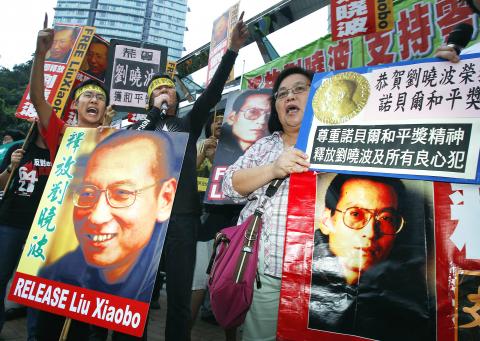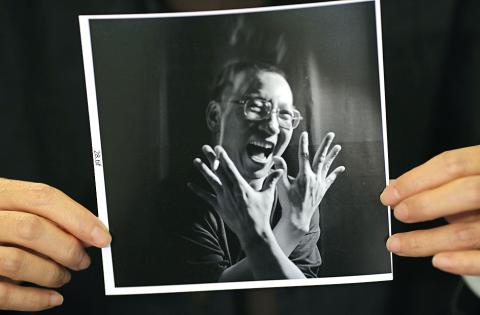Imprisoned Chinese dissident Liu Xiaobo (劉曉波), a key participant in the “Charter 08” initiative, was awarded this year’s Nobel Peace Prize yesterday for using non--violent means to demand fundamental human rights in his homeland, igniting a furious response from China, which accused the Norwegian Nobel Committee of violating its own principles by honoring “a criminal.”
Chinese state media immediately blacked out the news and Chinese government censors blocked Nobel Prize reports from Web sites. China declared the decision would harm its relations with Norway, while the Nordic country responded that was a petty thing for a world power to do.
Hours after the announcement, President Ma Ying-jeou (馬英九) congratulated Liu for winning the prize and called on China to address human rights issues with a more liberal attitude.

PHOTO: REUTERS
In a written statement, Ma described Liu’s winning the award as bearing “significant historical meaning” for the development of human rights in China, as well as Chinese communities around the world.
“We expect mainland China to address the issue of human rights with a whole new attitude, solve major human rights incidents with honesty and confidence, and treat dissidents with more tolerance,” Ma said.
The Chinese Nationalist Party (KMT) also congratulated Liu.

PHOTO: REUTERS
“Freedom, democracy and human rights are universal values, and Mr Liu’s winning the award at this time bears significant meaning,” KMT spokesman Su Jun-pin (蘇俊賓) said.
Presidential Office spokesman Lo Chih-chiang (羅智強) said Ma reiterated comments made previously on the anniversary of the Tiananmen Square Massacre that, in addition to economic development, China should seek breakthroughs in the development of human rights.
This year’s peace prize followed a long tradition of honoring dissidents around the world and was the first Nobel for China’s dissident community since it resurfaced after the Chinese Communist Party launched economic, but not political, reforms three decades ago.
Liu, 54, was sentenced last year to 11 years in prison for subversion. The Nobel committee said he was the first to be honored while still in prison, although other winners have been under house arrest or imprisoned before getting the prize.
Chinese authorities would not allow access to Liu yesterday.
His wife, however, expressed joy at the news. Surrounded by police at their Beijing apartment, Liu Xia (劉霞) was not allowed out to meet reporters. Instead, she gave brief remarks by phone and text message, saying she was happy and that she planned to go today to deliver the news to Liu Xiaobo at the prison, 500km away.
The Chinese Foreign Ministry lashed out at the Nobel decision, saying the award should have been used instead to promote international friendship and disarmament.
“Liu Xiaobo is a criminal who has been sentenced by Chinese judicial departments for violating Chinese law,” the statement said.
Honoring him “runs completely counter to the principle of the prize and is also a blasphemy to the peace prize,” it said.
The Dalai Lama also issued his public congratulations to Liu Xiaobo.
“I would like to take this opportunity to renew my call to the government of China to release Liu Xiaobo and other prisoners of conscience, who have been imprisoned for exercising their freedom of expression,” the spiritual leader said.
In a statement, released minutes after the announcement of the award, the Democratic Progressive Party (DPP) said it welcomed the decision to award Liu Xiaobo, adding that it was “deeply concerned” about the state of human rights in China
“Democracy, freedom and human rights are universal values,” the DPP said. “Liu [Xiaobo’s movement] was a call on the Chinese government to realize human rights and start democratic reform, leading to a democratic constitution.”
The party also said the government should redouble efforts to try to export democratic and human rights values to China through greater cross-strait exchanges.

TRAGEDY STRIKES TAIPEI: The suspect died after falling off a building after he threw smoke grenades into Taipei Main Station and went on a killing spree in Zhongshan A 27-year-old suspect allegedly threw smoke grenades in Taipei Main Station and then proceeded to Zhongshan MRT Station in a random killing spree that resulted in the death of the suspect and two other civilians, and seven injured, including one in critical condition, as of press time last night. The suspect, identified as a man surnamed Chang Wen (張文), allegedly began the attack at Taipei Main Station, the Taipei Fire Department said, adding that it received a report at 5:24pm that smoke grenades had been thrown in the station. One man in his 50s was rushed to hospital after a cardiac arrest

A car bomb killed a senior Russian general in southern Moscow yesterday morning, the latest high-profile army figure to be blown up in a blast that came just hours after Russian and Ukrainian delegates held separate talks in Miami on a plan to end the war. Kyiv has not commented on the incident, but Russian investigators said they were probing whether the blast was “linked” to “Ukrainian special forces.” The attack was similar to other assassinations of generals and pro-war figures that have either been claimed, or are widely believed to have been orchestrated, by Ukraine. Russian Lieutenant General Fanil Sarvarov, 56, head

SAFETY FIRST: Double the number of police were deployed at the Taipei Marathon, while other cities released plans to bolster public event safety Authorities across Taiwan have stepped up security measures ahead of Christmas and New Year events, following a knife and smoke bomb attack in Taipei on Friday that left four people dead and 11 injured. In a bid to prevent potential copycat incidents, police deployments have been expanded for large gatherings, transport hubs, and other crowded public spaces, according to official statements from police and city authorities. Taipei Mayor Chiang Wan-an (蔣萬安) said the city has “comprehensively raised security readiness” in crowded areas, increased police deployments with armed officers, and intensified patrols during weekends and nighttime hours. For large-scale events, security checkpoints and explosives

PUBLIC SAFETY: The premier said that security would be tightened in transport hubs, while President Lai commended the public for their bravery The government is to deploy more police, including rapid response units, in crowded public areas to ensure a swift response to any threats, President William Lai (賴清德) said yesterday after a knife attack killed three people and injured 11 in Taipei the previous day. Lai made the remarks following a briefing by the National Police Agency on the progress of the investigation, saying that the attack underscored the importance of cooperation in public security between the central and local governments. The attack unfolded in the early evening on Friday around Taipei Main Station’s M7 exit and later near the Taipei MRT’s Zhongshan